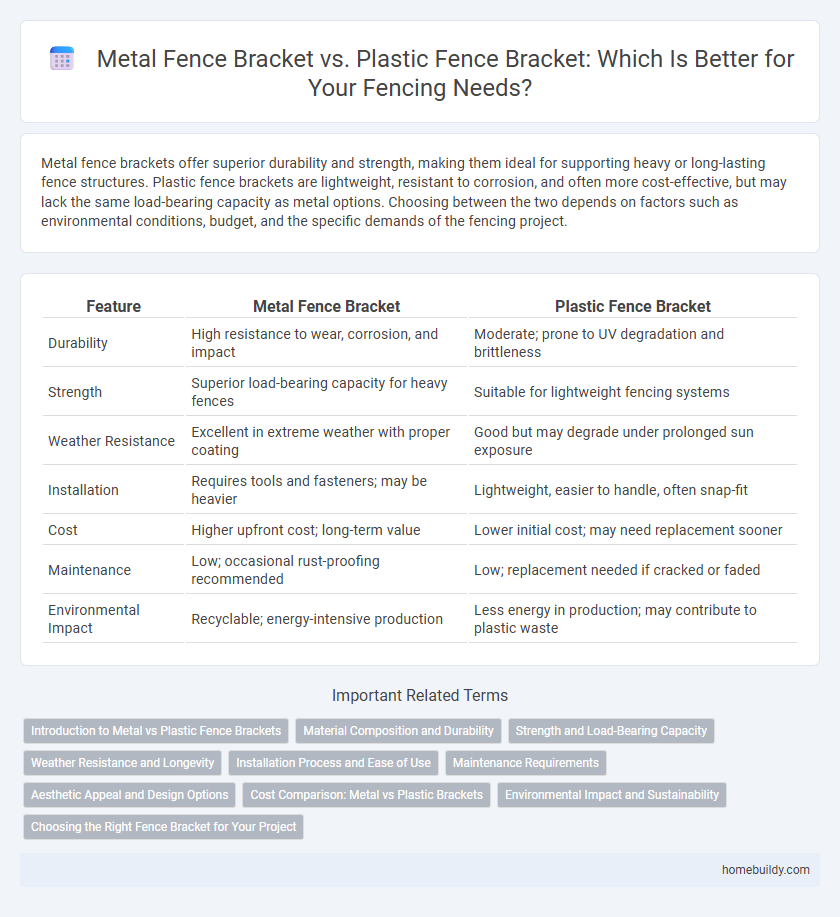Metal fence brackets offer superior durability and strength, making them ideal for supporting heavy or long-lasting fence structures. Plastic fence brackets are lightweight, resistant to corrosion, and often more cost-effective, but may lack the same load-bearing capacity as metal options. Choosing between the two depends on factors such as environmental conditions, budget, and the specific demands of the fencing project.
Table of Comparison
| Feature | Metal Fence Bracket | Plastic Fence Bracket |
|---|---|---|
| Durability | High resistance to wear, corrosion, and impact | Moderate; prone to UV degradation and brittleness |
| Strength | Superior load-bearing capacity for heavy fences | Suitable for lightweight fencing systems |
| Weather Resistance | Excellent in extreme weather with proper coating | Good but may degrade under prolonged sun exposure |
| Installation | Requires tools and fasteners; may be heavier | Lightweight, easier to handle, often snap-fit |
| Cost | Higher upfront cost; long-term value | Lower initial cost; may need replacement sooner |
| Maintenance | Low; occasional rust-proofing recommended | Low; replacement needed if cracked or faded |
| Environmental Impact | Recyclable; energy-intensive production | Less energy in production; may contribute to plastic waste |
Introduction to Metal vs Plastic Fence Brackets
Metal fence brackets offer superior durability and strength, making them ideal for supporting heavy fences and withstanding harsh weather conditions. Plastic fence brackets provide lightweight, corrosion-resistant options suitable for temporary or decorative fencing where load-bearing is less critical. Choosing between metal and plastic brackets depends on factors like fence material, environmental exposure, and long-term maintenance requirements.
Material Composition and Durability
Metal fence brackets, typically made from galvanized steel or aluminum alloys, offer superior strength and resistance to impact, corrosion, and extreme weather conditions compared to plastic counterparts. Plastic fence brackets, usually constructed from high-density polyethylene (HDPE) or PVC, provide lightweight and corrosion-resistant options but generally lack the load-bearing capacity and long-term durability of metal. Choosing metal brackets enhances fence stability and longevity, especially in high-stress or outdoor environments where durability is critical.
Strength and Load-Bearing Capacity
Metal fence brackets offer superior strength and exceptional load-bearing capacity, making them ideal for heavy-duty fencing applications and ensuring long-term durability under stress. Plastic fence brackets, while lightweight and resistant to corrosion, typically have lower load-bearing limits and are best suited for lighter fences or temporary installations. Choosing metal brackets enhances structural stability and supports heavier fence panels without bending or breaking.
Weather Resistance and Longevity
Metal fence brackets provide superior weather resistance and longevity due to their durable composition, often galvanized or stainless steel, which prevents rust and corrosion even in harsh environmental conditions. Plastic fence brackets, while resistant to moisture and non-corrosive, tend to degrade faster under prolonged exposure to UV rays and extreme temperature fluctuations. Choosing metal brackets ensures a longer-lasting and more robust fence structure, especially in climates with frequent rain, snow, or intense sun.
Installation Process and Ease of Use
Metal fence brackets offer a straightforward installation process with superior durability, often requiring standard tools such as drills and screws for secure attachment to posts and rails. Plastic fence brackets are lightweight and easier to handle, allowing for quicker installation without heavy-duty tools but may require careful alignment to avoid breakage. Both materials provide user-friendly options, but metal brackets tend to offer more stability and longevity in fence construction.
Maintenance Requirements
Metal fence brackets require periodic rust prevention treatments such as painting or applying anti-corrosion coatings to maintain longevity and structural integrity. Plastic fence brackets, in contrast, demand minimal maintenance, as they are resistant to rust and do not require repainting or protective coatings. Regular inspections of both types ensure secure fence installations and prevent potential damage.
Aesthetic Appeal and Design Options
Metal fence brackets offer a sleek, modern aesthetic with a variety of finishes such as powder-coated black or brushed steel, enhancing contemporary outdoor spaces. Plastic fence brackets provide versatile design options with customizable colors and shapes, allowing for creative and vibrant fence styles suitable for diverse environments. While metal brackets project durability and a polished look, plastic brackets support flexible design choices with a lightweight appearance.
Cost Comparison: Metal vs Plastic Brackets
Metal fence brackets typically have a higher upfront cost compared to plastic brackets due to the durability and strength of steel or aluminum materials. Plastic fence brackets offer a more budget-friendly option but may require replacement sooner, leading to increased long-term expenses. Evaluating total lifecycle costs reveals metal brackets provide better value for heavy-duty applications, while plastic brackets suit light-use scenarios with minimal investment.
Environmental Impact and Sustainability
Metal fence brackets offer greater environmental sustainability due to their recyclability and longer lifespan, reducing waste and resource consumption compared to plastic alternatives. Plastic fence brackets are often made from non-biodegradable materials and contribute to microplastic pollution, posing challenges for eco-friendly disposal. Choosing metal brackets supports circular economy goals by minimizing landfill contributions and promoting material reuse.
Choosing the Right Fence Bracket for Your Project
Metal fence brackets offer superior durability and strength, making them ideal for heavy-duty fencing projects that require long-lasting support. Plastic fence brackets provide lightweight, corrosion-resistant options suitable for temporary or decorative fencing where ease of installation and resistance to weathering are priorities. Selecting the right fence bracket depends on factors like load-bearing capacity, environmental exposure, and project longevity requirements.
Metal fence bracket vs Plastic fence bracket Infographic

 homebuildy.com
homebuildy.com